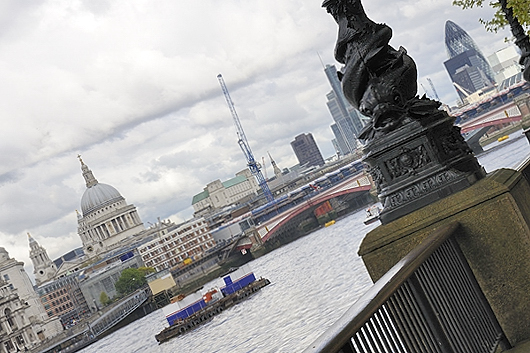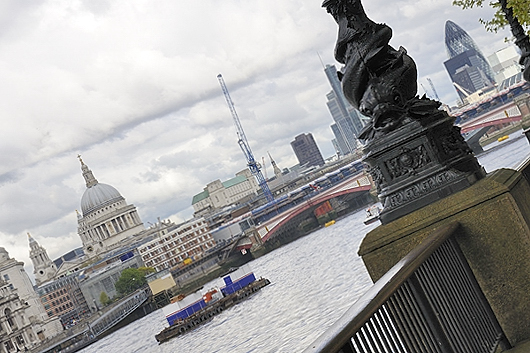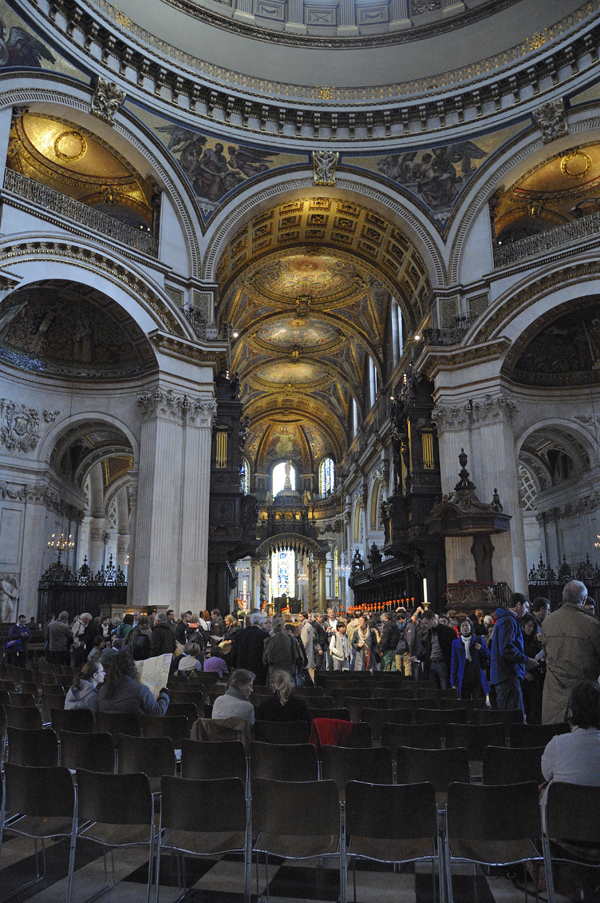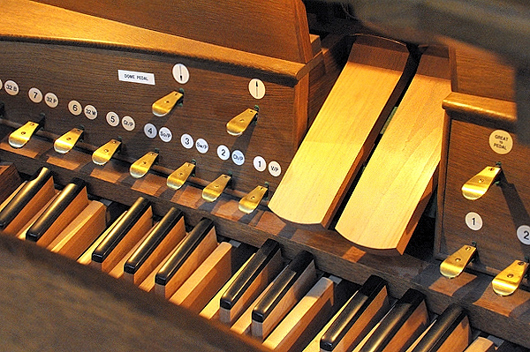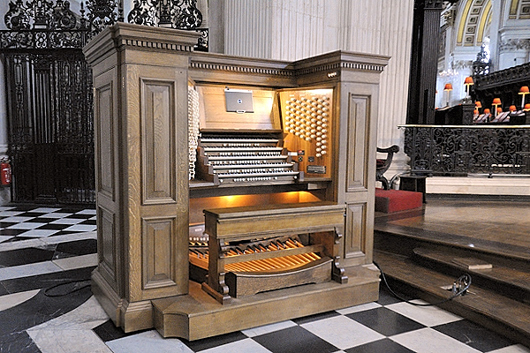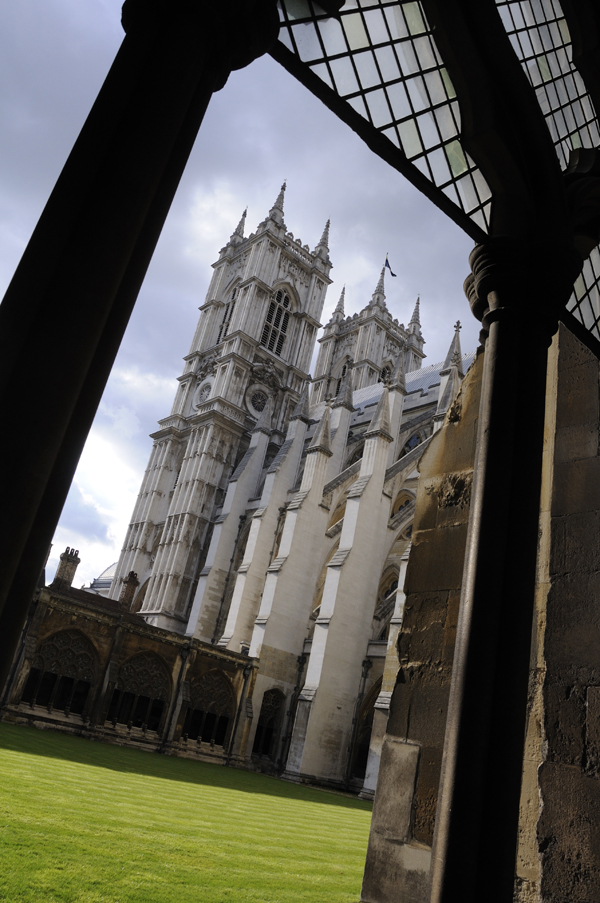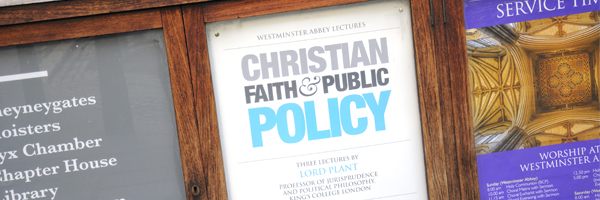Eines der mächtigsten und eindruckvollsten Bauwerke in London ist St. Paul̓s Cathedral, dem man sich am besten vom Südufer der Themse, von der Tate Modern über die Milleniumsbridge nähert. Es ist egal ob es regnet oder die Sonne scheint, die Vorstufen der Kirche sind immer voller Menschen oder besser gesagt Touristen. Der Eintritt beträgt 15 £, das entspricht derzeit rd. 18,50 €. Viel Geld um Zugang zu einem Gotteshaus gewährt zu bekommen. Für Westminster Abbey zahlt man sogar noch etwas mehr, umgerechnet nahezu 20 €. Museen sind kostenlos, aber Kirchen nicht. Ich verzichte, aus Prinzip. Und finde gegen Ende meines Aufenhaltes in London einen viel besseren und eindrucksvolleren Weg beide Häuser erleben zu dürfen.
One of London̓s most impressive buildings is St. Paul̓s Cathedral. The best way to approach this building is by starting at the Tate Modern on the south side of the Thames and crossing the river on the Millenium Bridge. Whether it is raining or sunny there are always people, or rather tourists, gathering on the front steps of the cathedral. The entrance fee is £ 15, which is about € 18,50. A lot of money to be granted entry into a church. For Westminster Abbey, London›s other famous church, charges are even higher, converted into Euro it is almost € 20. Museums are free of charge, but churches are not. I chose not to enter – out of principle. By the end of my stay in the city I will have found a way to experience these houses of God in a different, a rather nice way.
Sonntags, Dreiviertel Vier, ich besuche ein Orgelkonzert in der St. Paul̓s Cathedral. Obwohl es kostenlos ist, hätte ich hierfür gern etwas bezahlt. Spenden erwünscht. »The Grand Organ«, um 1700 von dem deutschen Orgelbauer Bernard Smith errichtet, und bis heute mehrfach überarbeitet und ergänzt, wurde von Gary Desmond, Bath, gespielt. Ob gläubig oder nicht, diese Musik geht unter die Haut, vor allem wenn man einmal für einen Moment die Augen schließt. Teilweise schien die Musik durch die ganze Kirche zu wandern. Der Organist erklärte später, das Teile der Orgel für den Besucher nicht sichtbar verbaut wurden. Wetter und Musik schienen sich auf einander einzuspielen, der Wechsel zwischen Sonnenschein und bewölktem Himmel passend zur Dramaturgie der Musik. Es waren Stücke von Hendrick Andriessen, Gerald Near, Max Reger, Richard Popplewell und Pierre Cochereau zu hören. Auf die Frage hin, wie man sich auf so einen Abend vorbereitet, antwortete Gary Desmond: »Ich habe gestern Abend geprobt und die Orgel hat sich das bis heute gemerkt.«
Sunday, quarter to five, I go to an organ recital in St. Paul̓s Cathedral. Although it had been free, I would not have minded paying for it. Donations are welcomed. The Grand Organ, built by the German organbuilder Bernard Smith around 1700, restored and altered several times over the centuries, was played by Gary Desmond from Bath. Whether you are religious or not does not matter, this music gets under your skin, especially when one closes one̓s eyes for a moment. Sometimes the music seemed to wander through the whole church. The organist explained afterwards that parts of the organ were built into the church decoration, invisible to the eyes of the visitors. Weather and music seemed to be joined together, the sun and therefore the light in the church changed to dramatic effect. Works of Hendrick Andriessen, Gerald Near, Max Reger, Richard Popplewell and Pierre Cochereau were played. On being asked how one prepares for an evening like this, Gary Desmond replied: »I rehearsed yesterday evening and the organ remembered all this for today.«
Selbstverständlich sind die Gottesdienste in beiden Häusern ebenfalls kostenlos. Westminster Abbey bietet darüber hinaus noch verschiedene Vortragsreihen an. Letzten Dienstag, am 1. Mai 2012, war der dritte Vortrag der Reihe »Christlicher Glaube und Staatstätigkeit« mit dem Thema »Glaube und die Verfassung« von Lord Plant, Professor der Rechtswissenschaften und politischer Philosoph am King̓s College London. Veranstaltungsort war die Lady Chapel, eine Kapelle in der Westminster Abbey, der Zugang erfolgte abseits der Touristen durch den Kreuzgang. Mit Westminster Palace nebenan, der ideale Ort für dieses kontroversielle Thema. Der Zeitpunkt ist ebenfalls passend, da derzeit die Debatte über Berufung der Erzbischöfe und Bischöfe ins House of Lords, dem Oberhaus des Britischen Parlamentes, entbrannt ist.
It goes without saying that worshipping in both houses of God are for free. Westminster Abbey also offers lectures. Last Tuesday was the last of three lectures on the topic of »Christian Faith and Public Policy« held by Lord Plant, professor of Jurisprudence and political philosophy, King̓s College London. The subject was »Faith and the Constitution« and the location for the event was the Lady Chapel, Westminster Abbey. Which is incidentally a rather beautiful spot to spend time in. Access was away from the tourists through the cloister. With the Palace of Westminster next door it was the ideal place for this controversial subject. Even the time of the event was chosen perfectly. Since the grounds for and the rightness of the calling of the archbishops and bishops of the Church of England into the House of Lords was starting to be discussed at this very moment.
Mit Verweis auf Sartre, zog Lord Plant zunächst eine Trennlinie zwischen der Identität eines jeden Menschen, wie Geschlecht, Sexualität, ethnischer Hintergrund; und dem Glauben, der frei wählbar ist – eine persönliche Entscheidung. Daher sollten identitätsbestimmende Faktoren entsprechend in der Gesetzgebung Berücksichtigung finden, der Glaube jedoch außen vor bleiben. Wenn der Glaube – abgesehen von der Religionsfreiheit – in die Gesetzgebung einflösse, würden in Zeiten der Multinationalität und daher Diversität der Religionen schnell kaum zu beantwortende Fragen auftauchen: Ab wann ist eine Religion Religion? Wie können nicht hierarchisch aufgebaute Religionen wie beispielsweise der Hinduismus Einfluss nehmen? Die Beantwortung der ersten Frage könnte, infolge der verschiedenen Abspaltungen und möglichen Neugründungen von Religionen, Gerichte über lange Zeit in Atem halten. Somit sollte auf eine Frage fokussiert werden: Kann durch die Ausübung einer Religion die Allgemeinheit Schaden nehmen? Einfache Frage, leicht zu beantworten und der Fokus wird wieder weg von Minderheiten auf das Wohlergehen der Allgemeinheit gelenkt.
With reference to Sartre, Lord Plant drawed the line between the identity of human beings, such as sex, sexuality, ethnic background and faith, which is basically a choice – a personal decision. Therefore, factors relating to identity should be allowed to have an effect on laws, whereas faith should not. If faith were to be allowed into the law – except, of course, freedom of religion – there would be a number of difficult questions to be answered in times of multinationality and diversity in religion: At what point does a religion become a religion? How then will non-hierarchical religions such as Hinduism be able to have an influence? And so on. To find an answer to the first question might block courts for quite some time, since old religions are separating into different subreligions and new religions are surfacing every other day. Therefore, the focus should be on just one question: Canthe exercise of a religion in any way harm society? Simple question, easy to answer and throws the focus once again back from minorities to the wellbeing of the general public as a whole.
Man hatte nicht das Gefühl das der Lord hinsichtlich der Debatte über die Bischöfe im House of Lords eindeutig Stellung bezog, aber vielleicht lag es auch nur an meinen mangelhaften Englischkenntnissen oder dem Einfluss dieses heiligen Vortragsortes: Würde sich die Kirche von England einen Gegner in dieser Debatte ins eigene Haus einladen? Oder war es einfach nur die alte Angewohnheit eines gut ausgebildeten und erfahrenen Lehrers das Interesse der Leute zu wecken und sie zum Nachdenken zu bringen, anstatt ihnen fertige Antworten zu präsentieren? Interessierte können alle Vorträge auf der Homepage von Westminster Abbey nachlesen oder sogar nachhören.
One did not get the feeling that the position of Lord Plant was crystal clear on the issue of the bishops being in the House of Lords. Maybe it had to do with my lack of knowledge of the English language. But maybe it was just the atmosphere of this holy building: The Church of England was not likely to have given an invitation to an opponent into their house? Or is it just the good old habit of a well-educated and experienced teacher to create interest in people and force them to think for themselves rather than presenting a well-prepared solution? Those who are interested in the talks can listen to them or read the tapescripts of all the lectures held at Westminster Abbey on its Homepage.
Beatrice Stude

